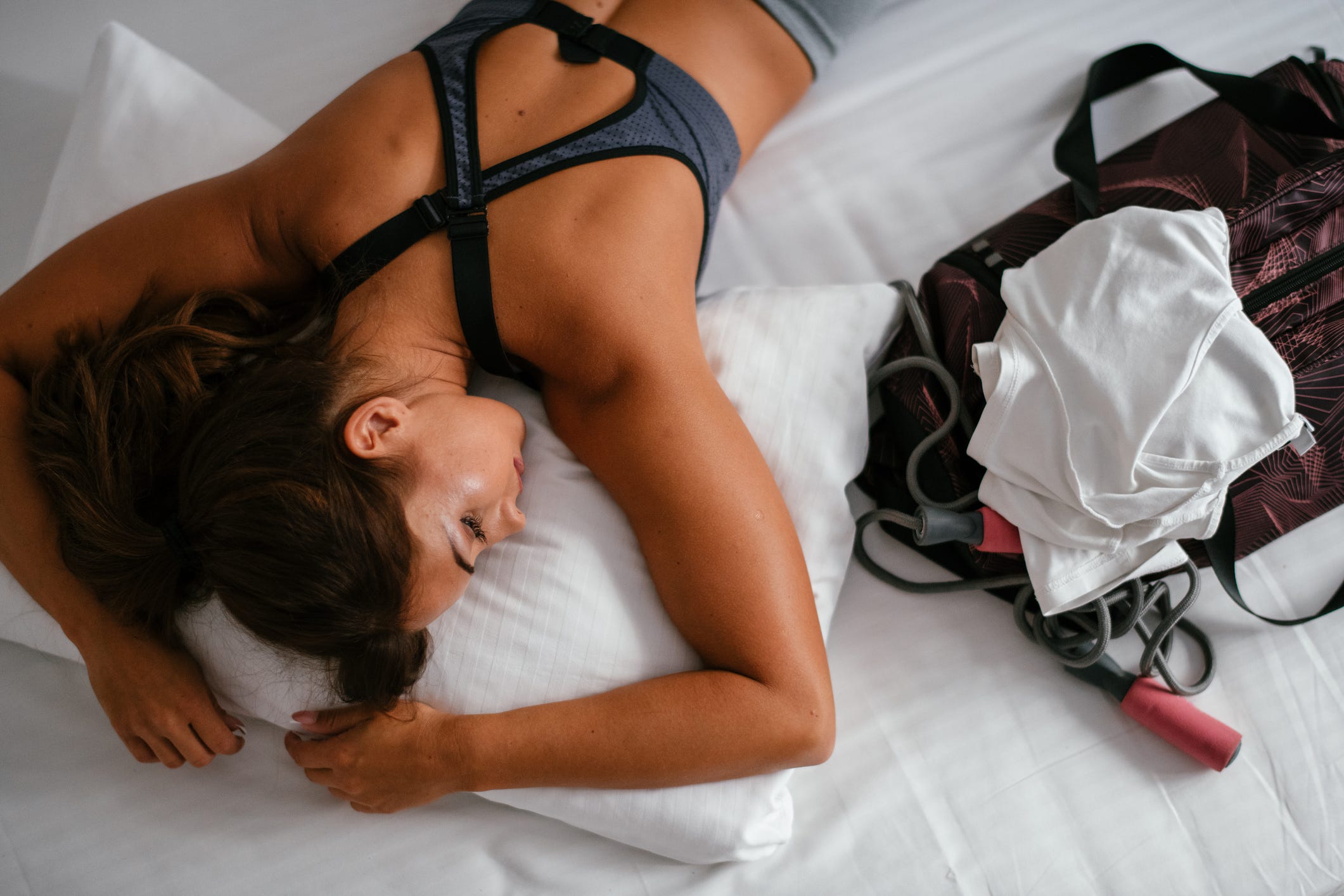- Many people who work jobs with demanding hours struggle to find time to work out, often not knowing whether to prioritize sleep or get up early to hit the gym.
- When fat loss is your goal, it’s true that both play an important role.
- You can lose weight without exercising by ensuring you’re eating in a calorie deficit, but you likely won’t sculpt the athletic physique you may desire.
- Create better sleeping habits and make time to be active at weekends to find time for both.
- You need to find whatever balance makes you feel your best.
- Read more Working it Out here.
- Visit Insider’s homepage for more stories.
Dear Rachel,
I’ve just started a new job and now the only time I have to exercise is before work (6 a.m. at the latest). Because of this, I’m losing out on a lot of sleep.
I’ve heard that sleep is really important for general wellbeing and weight loss (my goal). What’s more important and how can I fit in both?
– Confused
Dear Confused,
Yours is a dilemma I've ruminated on a lot in my own life over the years.
I'm very much an evening exerciser because I'm not a morning person (particularly in winter when it's so dark, no thank you). But when I know I won't be able to fit a workout in after work multiple days in a week, and I know how important it is to me to maintain my active lifestyle, should I get up earlier than normal to hit the gym?
It's a dilemma because as we all know, sleep is essential to good health - when I'm sleep deprived, I'm cranky and extra hungry all the next day, my muscles won't have had the repair and recovery time they need, plus I know I'm more susceptible to getting ill.
That said, will I actually feel worse both physically and mentally if I don't make time to work out? Will I be stressed out about not progressing towards my fitness goals?
It's one thing to have the odd week where you don't fit all your workouts in, and another if, like you, a change in lifestyle means morning exercise is your only option.
Sleep is scientifically proven to help weight loss
You're not wrong when you say sleep is important for weight loss - numerous studies have found links to suggest so.
Ben Carpenter, a qualified master personal trainer and strength and conditioning specialist, cited various examples to Insider:
"One study compared a single night of four hours versus eight hours of sleep time and found that shorter sleep duration coincided with higher hunger levels and a 559 calorie (i.e. 22%) increase in food intake, on average.
"On top of an increase in appetite, it makes sense that sleep deprivation may cause greater food intake, as being awake for longer is essentially a wider opportunity to eat."

Carpenter highlighted another study that compared 10-day periods where participants slept for either 5.5 or 8.5 hours per night, all while following a reduced-calorie diet.
"Although weight loss was similar in both groups, the shorter sleep duration resulted in less body fat lost and more lean body mass lost. Not ideal," Carpenter told Insider.

Considering you have a fat loss goal, Carpenter suggested various plans of action you could take:
- Exercise in the morning, but keep your workouts short to maximize sleep time
- Train fewer days than you might like to and thus get more sleep on some days than others
- Prioritize training on days you don't have to wake up early, ie. the weekend
- Forget waking up early but try and increase activity as part of your day (known as Non-Exercise Activity Thermogenesis, or NEAT), such as walking - this has been proven to contribute more to total calories burned in a day than a typical workout
- Get more sleep but make sure you're in a calorie deficit by eating a little less - this will be enough to result in weight loss, but won't create the athletic physique you may be after.
"There are no hard and fast rules, but if you know the options, you can pick and choose based on your own personal preference," said Carpenter.
Create better sleep habits
As you know, both sleep and exercise are important parts of maintaining a healthy lifestyle, so fat loss coach and qualified personal trainer Carter Good recommends trying to prioritize both by working out two to three times a week.
Good also stressed the importance of creating better sleep habits.

"The night before a workout day, you should be doing everything you can to get to bed on time to get at least seven to eight hours of sleep," he told Insider.
Good gave various pieces of advice on how to do this:
- "Create a nighttime routine that starts 30-45 minutes before you want to be asleep. This can help your body associate certain activities with going to bed.
- "Avoid bright blue lights once the sun goes down. Investing in a pair of blue blocker glasses will help.
- "Engage in activities that'll help you settle down for the night. I encourage my clients to spend time right before bed reading, meditating, and journaling.
- "Keep your phone out of reach. I know this one can be tough ... but I've seen it help my clients (and myself) tremendously. I'll set my alarm and plug in my phone across the room or under my bed. That way, I'm not tempted to scroll through social media."
There's no hard and fast rule as to whether sleep or exercise is better
We are all individual, and ultimately whether we are healthier, happier people as a result of getting up early to exercise or by getting that precious shut-eye will vary from person to person.
You probably won't know what your body needs and what makes you feel your best until you try a few different ways to structure your sleep and workout regimes.
Ultimately, I tend to settle on what will make me feel better. I don't feel good when I haven't had enough sleep, so I usually prioritize sleep over the gym and won't force myself to struggle through something I hate.
However, if that's the only time I can work out all week, I might do it occasionally - but only if I can get to bed at a decent time the night before. And if I struggle to fall asleep for hours, I'll cancel my gym plans too.
For me, sleep is number one.
You need to find what's right for you, but it's definitely possible to find the right balance.
Wishing you well,
Rachel
As Insider's senior lifestyle reporter and a self-described fitness fanatic, Rachel Hosie is fully immersed in the wellness scene and is here to answer all your burning questions. Whether you're struggling to find the motivation to go for a run, confused about light versus heavy weights, or unsure whether you should be worried about how much sugar is in a mango, Rachel is here to give you the no-nonsense answers and advice you need, with strictly no fad diets in sight.
Rachel has a wealth of experience covering fitness, nutrition, and wellness, and she has the hottest experts at her fingertips - she regularly speaks to some of the world's most knowledgeable and renowned personal trainers, dietitians, and coaches, ensuring she's always up to date with the latest science-backed facts you need to know to live your happiest and healthiest life.
Have a question? Ask Rachel at [email protected] or fill out this anonymous form. All questions will be published anonymously.
Read more Working it Out:
- I want to exercise more for my mental health but always lose motivation and give up. How do I make an active lifestyle stick?
- I work long hours and can fit in only a 30-minute workout each day. What exercise should I do to burn the most calories?
- I'm a longtime runner who recently took up weightlifting, but my body hasn't changed. What am I doing wrong?
- I gained weight from comfort food after my miscarriage. How can I get back to feeling like myself again?
- I lost 20 pounds and felt amazing, but now I've regained the weight and am back where I started. What should I do?

